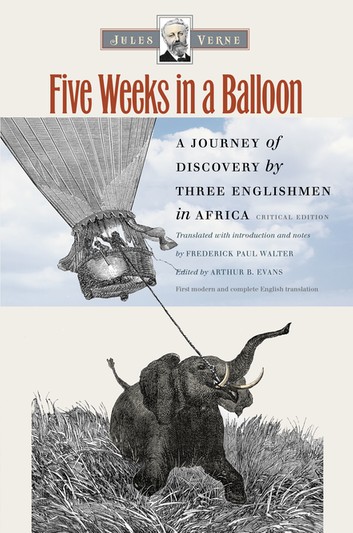Book Review: Five Weeks in a Balloon by Jules Verne
It is 1863, and Dr. Samuel Ferguson has a plan to do something no man has done before, cross the entire continent of Africa from west to east! But he’s not going to do it on foot or riding animal, but in a balloon. You might be thinking, “well, I suppose he could use a motor to propel a hydrogen balloon, like some sort of ship of the air.” But alas, Dr. Ferguson has not developed an engine light enough/a balloon big enough for that. He has, however, created a powerful battery that creates an abundance of hydrogen from water at will, and a unique double shell balloon that allows him to change altitude without need for ballast or venting gas. He shall name it…Victoria!

This was the first of Jules Verne’s (1828-1905) “Extraordinary Voyages” novels, and his first published book. It sold very well, and launched his long and productive career. The story is one of the ancestors of modern science fiction, using one fantastical element (the advanced balloon) to facilitate an adventure story.
Savant Dr. Ferguson is joined in his adventures by his Scots friend Dick Kennedy, an expert big game hunter, and his manservant Joe, who is keen-sighted, acrobatic, and a general source of optimism and good humor.
The goal is to link up the various previous European expeditions into the African interior, and discover the true source of the Nile. The trio takes off from the Zanzibar archipelago, maneuvering to catch the westward trade winds. At first all goes well, and the small adventures are more amusing than dangerous. But about midway, the protagonists make some well-meaning choices that damage the balloon, and things get a lot dicier.
Good: There’s plenty of adventure to hand, with the danger and desperation mounting as our heroes’ vehicle becomes less reliable and their resources dwindle. They have to rely on their courage and pluck (but also have moments of gloom and despair) and some quick thinking to survive.
Verne uses a lot of real-world explorers as touchstones, which makes for more verisimilitude, and also makes me wish for an annotated version that gives more detail on all the names being dropped. He spends a fair amount of page space doing the math, which makes the Victoria look far more plausible than it actually is.
Less good: Period racism is easily seen in the way the inhabitants of Africa are depicted. Slavery comes up multiple times, starting in Zanzibar, as a habit of the ignorant and cannibalistic black people, and the Arab traders. Never is it mentioned how much influence Europeans had on the slave trade. (Americans can ill afford to be smug here–in 1863, slavery was still legal in parts of the Union!)
The Africans are also superstitious and easily tricked by our British protagonists. (In fairness, Jules Verne didn’t know any Africans at the time and was mostly relying on tales brought back by European explorers.)
Dr. Ferguson is a born lecturer, and is prone to giving infodumps at the drop of a hat, which becomes really obvious after a while and it’s a good thing that his friends really like him because man that would be irritating.
Some of the treatment of animals is cruel by modern standards.
It’s a decent first novel, but soon would be eclipsed by Verne’s more famous works. Recommended primarily for readers who want to see how his early work developed.
There was a very loose film adaptation in 1962:

